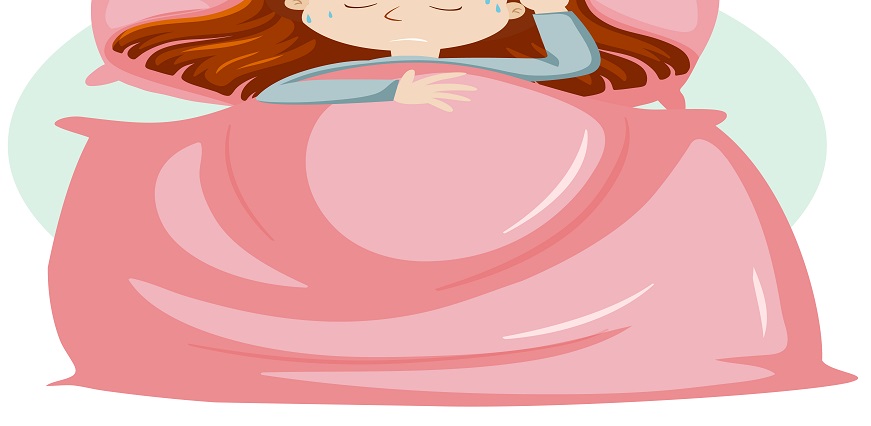





No lab centers are available in this city

Night sweats are very common during menopause, but sweating from night to night when you’re not sleeping may be a sign of an infection, diabetes, or cancer. Night sweats may also be a side effect of the medicine you’re taking. Talk to your doctor or a member of the health care team right away so they can connect you with treatments specifically designed to manage your symptoms and moisture control.
Night sweats are intense and drenching enough to soak through your clothes and bedding, interrupting your sleep. This is usually a healthy way to cool your body down and keep it at a safe temperature.
One night, you may wake up in the middle of the night with a sudden feeling of heat and cold sweat between your sheets. You'll experience an increased heart rate with reddened skin followed by sweating. You'll wonder what is causing these unsettling changes in your sleep, as they aren't comfortable at all.
Night sweats are a common symptom of menopause. If you experience night sweats in tandem with other symptoms, this may indicate the presence of an underlying condition that warrants medical attention.
There are two types of night sweats: true night sweats and false night sweats.
There are many potential causes of night sweats. One common cause is menopause. During menopause, hormonal changes can cause hot flashes and night sweats. Other potential causes include infection, anxiety, low blood sugar, thyroid problems, and certain medications. If you're experiencing night sweats, talk to your doctor to determine the underlying cause.
There are a number of different symptoms that can be associated with night sweats. These can include wakefulness during the night due to sweating, drenching night sweats, and waking up in the morning with damp sheets or clothes. Night sweats can also be accompanied by other symptoms such as hot flashes, chills, headache, and heart palpitations. In some cases, night sweats may be a sign of a more serious underlying medical condition such as infection, hormone imbalance, or cancer.
Night sweats are not as common in women as they are in men, but they can occur at any age.
If you experience any of these symptoms on a regular basis, it is important to speak to your doctor to rule out any potential causes.
To prevent night sweats, it is important to:
There are many potential treatments for night sweats, and the best approach depends on the underlying cause. If night sweats are due to hot flashes associated with menopause, hormone therapy may be effective. Other potential treatments include anti-anxiety medications, antidepressants, and blood pressure medications. If night sweats are caused by an infection, treating the infection will usually resolve the problem. Night sweats can also be a side effect of some medications, so changing medications may be necessary. In some cases, making lifestyle changes such as sleeping in a cool room or wearing loose-fitting clothing can help to reduce night sweats.
Night sweats can be a symptom of many different conditions, so it's important to speak to your doctor if you're experiencing them. However, there are some things you can do at home to help manage night sweats and get a better night's sleep. Try wearing loose-fitting clothing to bed and keeping a cool environment in your bedroom. You might also want to avoid spicy foods or alcohol before bedtime. If night sweats are disrupting your sleep and affecting your quality of life, talk to your doctor about possible treatment options.
 Allergy Test
Allergy Test
 Anemia Test
Anemia Test
 Auto immune
Auto immune
 Blood disorder
Blood disorder
 Bone and Joint
Bone and Joint
 Cancer Test
Cancer Test
 Cardiology Test
Cardiology Test
 Covid Recovery
Covid Recovery
 Dengue Test
Dengue Test
 Depression
Depression
 Diabetes Test
Diabetes Test
 Fatigue
Fatigue
 Fever Test
Fever Test
 Full body
Full body
 Gastro Test
Gastro Test
 Gastrointestinal
Gastrointestinal
 Gynaecology Test
Gynaecology Test
 Heart Test
Heart Test
 HIV Test
HIV Test
 Hormone Test
Hormone Test
 Hypertension
Hypertension
 Immunity Test
Immunity Test
 Infectious Disease
Infectious Disease
 Infertility Test
Infertility Test
 Influenza Test
Influenza Test
 Iron Test
Iron Test
 Kidney Test
Kidney Test
 Liver Test
Liver Test
 Lung Test
Lung Test
 Nephrology
Nephrology
 Obesity
Obesity
 Orthopedics Test
Orthopedics Test
 Physician
Physician
 Pollution Health Checkup
Pollution Health Checkup
 Pregnancy Test
Pregnancy Test
 Prostate Test
Prostate Test
 Senior Citizen Test
Senior Citizen Test
 STD Test
STD Test
 Thyroid Test
Thyroid Test
 Tuberculosis Test
Tuberculosis Test
 Vitamin Test
Vitamin Test
 Women Health Test
Women Health Test
Sign up takes less than 60 secs and gives you access to your offers, orders and lab tests.
Looks like you are not registered with us. Please Sign up to proceed
OTP will be sent to this number by SMS
We have successfully received your details. One of the agents will call you back soon.
 To reach our help desk call 9213188888
To reach our help desk call 9213188888
No Lab Centers are available in this city
Looks like you are not registered with us. Please Sign up to proceed
OTP will be sent to this number by SMS
Not Registered Yet? Signup now.Looks like you are not registered with us. Please Sign up to proceed





 7982100200
7982100200.png)